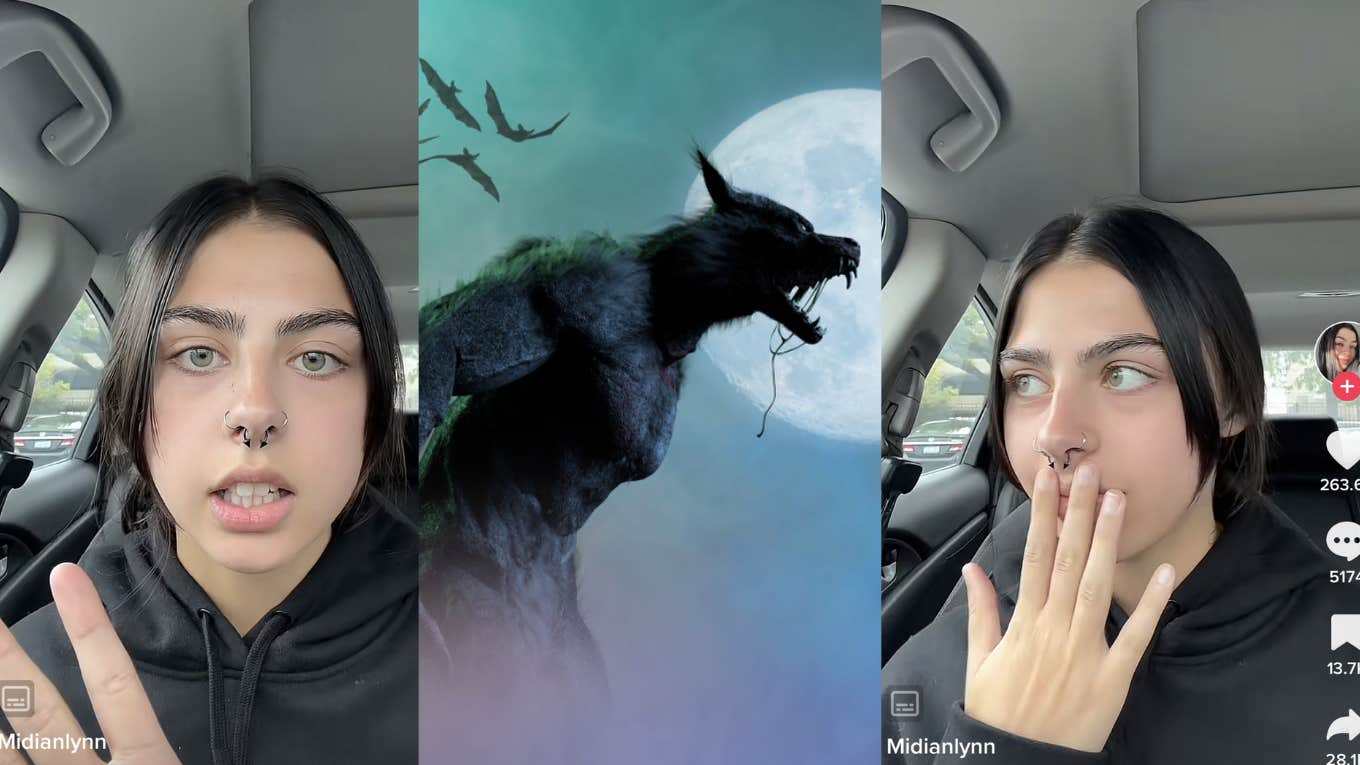Woman Explains Growing Up With A Mom Who Thought She Was A Werewolf — 'She Took Me To The Zoo Once A Week To Be With Her Family'
Her upbringing highlights the whirlwind of being raised by a parent struggling with addiction.
 Denis --- S / Shutterstock / @midianlynn / TikTok
Denis --- S / Shutterstock / @midianlynn / TikTok Growing up, we most likely all heard urban legends about mythical creatures that lurked around during the night, including werewolves. The legend is found in cultures all over the world, and we probably hoped to never encounter the wolf-like creature that would come to life during a full moon.
However, one woman detailed her especially profound fear of werewolves — considering that she lived with one as a child.
She recalls a childhood consisting of fangs, bizarre forest wallpaper, and trips to the zoo so that she could visit her “family.”
The woman’s mother was an addict who believed that she was a werewolf.
TikTok user @midianlynn revealed her story in a video in which she challenges viewers to “put a finger down if your entire life your drug addict mother has been completely convinced that she is a werewolf” (hopefully no one has to).
The woman admits that her mother’s delusion made her upbringing notably challenging and much different from the rest of her peers. She claims that she “hated” bringing her friends around her home since her mother would show them the “fangs” she had as a werewolf, scaring the poor children.
The mother referred to the woman as her “pup,” had various wolf-related tattoos, and decorated her home with forest-themed wallpaper so she could feel as if she was “at home.”
At least once a week, she would take the woman to the zoo to visit the wolf exhibit so that she could “she could be with her family.”
The woman revealed that her mother’s behavior became too much for her and she ceased contact with her when she was in third grade. It wasn't until she was in high school that she heard of her werewolf mother again after her maternal grandparents came to visit her at her job.
According to the woman’s grandfather, her mother had to be admitted to a psychiatric institute after she bit multiple people, with some bites being so severe they became infected. After she was released, she fell in love and got engaged to a man who believed that he was a dragon.
The woman says that her childhood is the primary reason she “hates” wolves.
However, in a follow-up video, the woman shares that she is “fine” despite her chaotic family since she had a strong support system on her father’s side of the family and that she has always had a mother figure in her life. Additionally, she reveals that her mother does not have any mental illnesses, including autism, that would explain her behavior.
As of right now, the dragon and the werewolf “have not bred” and the woman does not have any mythical half-siblings.
She also provides viewers with a photo of her mother visiting the wolf exhibit at the zoo, pressing her palm (which the woman calls her “paw”) to the glass that separated her from the rest of her “family.”
The woman's mother's delusions depict the heartbreaking reality of having a parent struggling with addiction.
Although many people found the story to be comical, and some details would definitely evoke a chuckle from some, the reality of the situation is rather heartbreaking.
The woman’s mother’s substance abuse could have very well been the culprit of her werewolf delusions. Drug-induced psychotic episodes can occur, which can result in paranoia and hallucinations, even when presented with reality and evidence that contradicts their beliefs. Not only do these hallucinations negatively impact the user, but also those around them, especially their children.
One in five children in the U.S. lives with a parent battling addiction and will suffer developmental and behavioral issues as a result. Even if their parents are attempting to recover and do not intentionally neglect their children, it can still unfortunately happen.
“When drugs and alcohol become the priority, parents begin to lose focus on their role and how important it is to be physically and emotionally available to their children,” Dr.Todd Thatcher, a certified psychiatrist, told Valley Behavioral Health. '
“The emotional impact of substance abuse is severe, as children learn their needs are no longer a priority.”
Children can encounter problems including anxiety, stress, and abandonment issues that can follow them into adulthood.
While the woman may claim that she is fine now, it does not mean that her upbringing was not traumatic. Not only was she especially afraid of werewolves, but she also lost a healthy mother-daughter connection at the hands of drug addiction.
Even though her mother was the one living in a fantasy world, the woman was likely the one who desperately needed an escape into an imaginary world. Preferably one without any werewolves, dragons, and drugs in sight.
If you or someone you know is battling substance abuse, contact the Substance Abuse and Mental Health Services Administration's (SAMHSA) National Helpline at 1-800-662-HELP (4357) for more information and mental health referrals.
Megan Quinn is a writer at YourTango who covers entertainment and news, self, love, and relationships.
